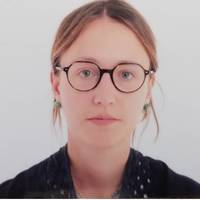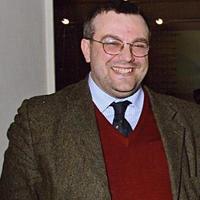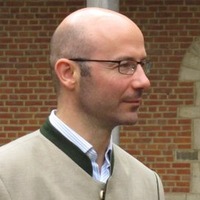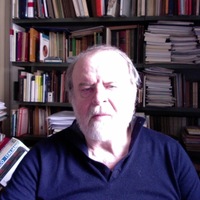
Martina Perotta
Martina is a Ph. D. Candidate in Jewish Thought, enrolled in the Doctoral program "European Cultures. Environments, contexts, histories, arts, ideas" at the University of Trento (Italy). She completed her studies in Philosophical Sciences (MPhil) and Philosophy (Bachelor) with distinction at the University of Trento. Her master thesis in Jewish Thought entitled "Tradition and Modernity in David Hartman’s Halakhic Hermeneutics" was discussed under the supervision of Professor Massimo Giuliani. In the academic year 2021/2022, she received a specialization degree in ‘Cultural Sciences’ at the Fondazione Collegio San Carlo International School for Advanced Studies located in Modena (Italy). Her doctoral research is focused on reconstructing a liberal and spiritual conceiving of Zionist identity strictly linked to the normative paradigm of the "Covenantal Conscience". The project investigates some ideological, communal, and social instances that emerged within the spiritual-religious current of Zionism starting from the 1970s, with keen attention to the contributions of three Israeli scholars: David Hartman (1930-2013), Eliezer Schweid (1929-2022) and Aviezer Ravitzky (1945). Her research interests focus on Modern and Contemporary Jewish Thought, with emphasis on topics such as political theology, philosophy of Halakhah, Jewish messianism, and streams of Modern Orthodoxy.
Supervisors: Prof. Massimo Giuliani, Prof. Gershon Greenberg, and Prof. Avinoam Rosenak
Supervisors: Prof. Massimo Giuliani, Prof. Gershon Greenberg, and Prof. Avinoam Rosenak
less
Related Authors
Pierangelo Buongiorno
Università Di Macerata
Lucia Giardino
Florence University of the Arts
Andrea Balbo
Università degli Studi di Torino
Laura Mecella
Università degli Studi di Milano - State University of Milan (Italy)
Andrea A. Robiglio
KU Leuven
Christian Del Vento
Università degli studi di Pavia
InterestsView All (40)









Uploads
Talks by Martina Perotta
The presentation will explore the broader context of the Hebrew and princely patronage during the Renaissance and the era of and the era of Christian Hebraism. We will examine how the interests of the Italian nobility's interest in Hebrew texts and Jewish knowledge contributed to the to the preservation of important Jewish works, and how scholars such as HIDA used these collections for their research. This exploration will shed light on the complex relationship between Jewish intellectual history and the cultural milieu of 18th-century Italy, revealing the unexpected intersections of Jewish mysticism, Renaissance humanism, and aristocratic book collecting.
Maoz Kahana (PhD) is an associate Professor in the Jewish History Department, Tel Aviv University. His research focuses on deciphering and elucidating rabbinical literature and Jewish law and legal cultures within the social and intellectual contexts of early modern and modern European history as well as its minority Jewish culture.
His research and teaching integrates intellectual and social history; legal and cultural methods.Characteristic themes of his work are print and book history, the scientific revolution, magic, law, and the divine; Rabbi's allure to Sabbatian literature, Chassidic Halakhic writings, Jewish legal cultures and European romanticism, the emergence of European coffeehouses, and others.
His book "Halakhic Writing in a Changing World, from the ‘Noda B’yhuda’ to the ‘Hatam Sofer’, 1730-1839", based on his doctoral :dissertation, was published in the Zalman Shazar Publication House, Jerusalem (2015). A second book, “A Heartless Chicken and other Wonders: Religion and Science in Early Modern Rabbinic Culture”, was published (2021) in Bialik Institute Publishing House, Jerusalem.
webpage to reserve a spot on Zoom (til 12nd Nov, h. 12.00): https://webmagazine.unitn.it/evento/lettere/122421/kabbalistic-treasures-hidden
Boaz Huss is the Aron Bernstein Chair in Jewish History at the dept. of Jewish Thought and the chairperson of the Goldstein-Goren International Center for Jewish Thought at the Ben-Gurion University. His research interests include history of Kabbalah, Western Esotericism, and New Religious Movements. His publications include The Cosmic Movement: Sources, Contexts, Impact (Bialik Press, 2021, together with Julie Chajes), Mystifying Kabbalah: Academic Scholarship, National Theology, and New Age Spirituality, Oxford University Press, 2020, and The Zohar: Reception and Impact, Liverpool University Press, 2016. He is currently engaged in research of comparative mysticism, of the Jewish followers of the Theosophical Society, and of Anthroposophy in Israel.
Le thème retenu pour cette édition est « mobilités et passages ».
Direttori: prof. Carlo Altini (Università di Modena e Reggio Emilia), Francesco Maiolo (Università Roma Tre)
Martina Perotta (Università di Trento), L'alleanza, il messianico e la coscienza intermedia. Una sfida modernista per la teologia politica ebraica
Il contributo si propone di analizzare alcuni approcci contemporanei di auto-comprensione della coscienza collettiva ebraica, con riferimento all’opera della passata generazione di accademici israeliani presso l’Università ebraica di Gerusalemme. L’obiettivo è quello di ricostruire una significativa operazione di riconfigurazione filosofica e culturale della coscienza sionista, nella sua variante spiritual-religiosa, verificatasi a partire dalla metà degli anni Settanta del Novecento. L’analisi si concentra sulla chiarificazione di aspetti antropologici della personalità dell’ebreo sionista, alimentata da riorientamenti modernisti della tradizione ebraica. Risaltano così due principali modelli teologico-politici – associati a due diverse tipologie di ‘coscienza religiosa’: il paradigma “pattale” (covenantal) o “normativo” ed il paradigma “messianico” o “essenzialista”.
Il contributo intende dimostrare come tali modelli abbiano avuto un significativo impatto sulla formazione di una moderna coscienza collettiva ebraica, quand’anche considerata un fenomeno puramente culturale e secolare. Riflettendo sulla “sfida modernista” che è posta dalla creazione di una nuova e riacquisita “comunità/soggettività politica” (third Jewish commonwealth), le opere di David Hartman (1931-2013), Eliezer Schweid (1929-2022) e Aviezer Ravitzky (1945) vogliono mostrare come sia possibile pensare una ‘terza via’, lontana dai massimalismi ideologici e dagli sciovinismi politici, in grado di condensare la cogenza ispiratrice dell’utopia messianica e la pregnanza etico-halakhica dell’Alleanza.
Responsabili scientifici: Michele Nicoletti, Tiziana Faitini
Discussants: Tiziana Faitini, Mauro Nobile, Gabriele Pulvirenti, Federica Biscardi, Martina Perotta
Oxford Centre for Jewish and Hebrew Studies in conjunction with the Philip and Muriel Berman Center for Jewish Studies, Lehigh University
Panel: Innovation, Halakhah and the Transnational Turn
Discussion paper: "The God-Intoxicated Consciousness". A Philosophy of Halakhic Authority and Innovation in the Works of David Hartman.
Respondant in panel: Magic, Mysticism and Leadership
Papers by Martina Perotta
An Upside-down World. Narrations, Utopias and Messianism in Jewish Thought”, Collana Studi e
Ricerche, nr. 31, Università di Trento, Trento, pp. 155-174
Conference Presentations by Martina Perotta
The presentation will explore the broader context of the Hebrew and princely patronage during the Renaissance and the era of and the era of Christian Hebraism. We will examine how the interests of the Italian nobility's interest in Hebrew texts and Jewish knowledge contributed to the to the preservation of important Jewish works, and how scholars such as HIDA used these collections for their research. This exploration will shed light on the complex relationship between Jewish intellectual history and the cultural milieu of 18th-century Italy, revealing the unexpected intersections of Jewish mysticism, Renaissance humanism, and aristocratic book collecting.
Maoz Kahana (PhD) is an associate Professor in the Jewish History Department, Tel Aviv University. His research focuses on deciphering and elucidating rabbinical literature and Jewish law and legal cultures within the social and intellectual contexts of early modern and modern European history as well as its minority Jewish culture.
His research and teaching integrates intellectual and social history; legal and cultural methods.Characteristic themes of his work are print and book history, the scientific revolution, magic, law, and the divine; Rabbi's allure to Sabbatian literature, Chassidic Halakhic writings, Jewish legal cultures and European romanticism, the emergence of European coffeehouses, and others.
His book "Halakhic Writing in a Changing World, from the ‘Noda B’yhuda’ to the ‘Hatam Sofer’, 1730-1839", based on his doctoral :dissertation, was published in the Zalman Shazar Publication House, Jerusalem (2015). A second book, “A Heartless Chicken and other Wonders: Religion and Science in Early Modern Rabbinic Culture”, was published (2021) in Bialik Institute Publishing House, Jerusalem.
webpage to reserve a spot on Zoom (til 12nd Nov, h. 12.00): https://webmagazine.unitn.it/evento/lettere/122421/kabbalistic-treasures-hidden
Boaz Huss is the Aron Bernstein Chair in Jewish History at the dept. of Jewish Thought and the chairperson of the Goldstein-Goren International Center for Jewish Thought at the Ben-Gurion University. His research interests include history of Kabbalah, Western Esotericism, and New Religious Movements. His publications include The Cosmic Movement: Sources, Contexts, Impact (Bialik Press, 2021, together with Julie Chajes), Mystifying Kabbalah: Academic Scholarship, National Theology, and New Age Spirituality, Oxford University Press, 2020, and The Zohar: Reception and Impact, Liverpool University Press, 2016. He is currently engaged in research of comparative mysticism, of the Jewish followers of the Theosophical Society, and of Anthroposophy in Israel.
Le thème retenu pour cette édition est « mobilités et passages ».
Direttori: prof. Carlo Altini (Università di Modena e Reggio Emilia), Francesco Maiolo (Università Roma Tre)
Martina Perotta (Università di Trento), L'alleanza, il messianico e la coscienza intermedia. Una sfida modernista per la teologia politica ebraica
Il contributo si propone di analizzare alcuni approcci contemporanei di auto-comprensione della coscienza collettiva ebraica, con riferimento all’opera della passata generazione di accademici israeliani presso l’Università ebraica di Gerusalemme. L’obiettivo è quello di ricostruire una significativa operazione di riconfigurazione filosofica e culturale della coscienza sionista, nella sua variante spiritual-religiosa, verificatasi a partire dalla metà degli anni Settanta del Novecento. L’analisi si concentra sulla chiarificazione di aspetti antropologici della personalità dell’ebreo sionista, alimentata da riorientamenti modernisti della tradizione ebraica. Risaltano così due principali modelli teologico-politici – associati a due diverse tipologie di ‘coscienza religiosa’: il paradigma “pattale” (covenantal) o “normativo” ed il paradigma “messianico” o “essenzialista”.
Il contributo intende dimostrare come tali modelli abbiano avuto un significativo impatto sulla formazione di una moderna coscienza collettiva ebraica, quand’anche considerata un fenomeno puramente culturale e secolare. Riflettendo sulla “sfida modernista” che è posta dalla creazione di una nuova e riacquisita “comunità/soggettività politica” (third Jewish commonwealth), le opere di David Hartman (1931-2013), Eliezer Schweid (1929-2022) e Aviezer Ravitzky (1945) vogliono mostrare come sia possibile pensare una ‘terza via’, lontana dai massimalismi ideologici e dagli sciovinismi politici, in grado di condensare la cogenza ispiratrice dell’utopia messianica e la pregnanza etico-halakhica dell’Alleanza.
Responsabili scientifici: Michele Nicoletti, Tiziana Faitini
Discussants: Tiziana Faitini, Mauro Nobile, Gabriele Pulvirenti, Federica Biscardi, Martina Perotta
Oxford Centre for Jewish and Hebrew Studies in conjunction with the Philip and Muriel Berman Center for Jewish Studies, Lehigh University
Panel: Innovation, Halakhah and the Transnational Turn
Discussion paper: "The God-Intoxicated Consciousness". A Philosophy of Halakhic Authority and Innovation in the Works of David Hartman.
Respondant in panel: Magic, Mysticism and Leadership
An Upside-down World. Narrations, Utopias and Messianism in Jewish Thought”, Collana Studi e
Ricerche, nr. 31, Università di Trento, Trento, pp. 155-174